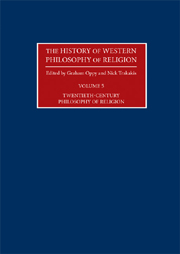Book contents
- Frontmatter
- Contents
- Editorial Introduction
- Contributors
- 1 Twentieth-Century Philosophy of Religion: An Introduction
- 2 William James
- 3 Henri Bergson
- 4 John Dewey
- 5 Alfred North Whitehead and Charles Hartshorne
- 6 Bertrand Russell
- 7 Max Scheler
- 8 Martin Buber
- 9 Jacques Maritain
- 10 Karl Jaspers
- 11 Paul Tillich
- 12 Karl Barth
- 13 Ludwig Wittgenstein
- 14 Martin Heidegger
- 15 Emmanuel Levinas
- 16 Simone Weil
- 17 A. J. Ayer
- 18 William P. Alston
- 19 John Hick
- 20 Mary Daly
- 21 Jacques Derrida
- 22 Alvin Plantinga
- 23 Richard Swinburne
- 24 Late-Twentieth-Century Atheism
- Chronology
- Bibliography
- Index
14 - Martin Heidegger
- Frontmatter
- Contents
- Editorial Introduction
- Contributors
- 1 Twentieth-Century Philosophy of Religion: An Introduction
- 2 William James
- 3 Henri Bergson
- 4 John Dewey
- 5 Alfred North Whitehead and Charles Hartshorne
- 6 Bertrand Russell
- 7 Max Scheler
- 8 Martin Buber
- 9 Jacques Maritain
- 10 Karl Jaspers
- 11 Paul Tillich
- 12 Karl Barth
- 13 Ludwig Wittgenstein
- 14 Martin Heidegger
- 15 Emmanuel Levinas
- 16 Simone Weil
- 17 A. J. Ayer
- 18 William P. Alston
- 19 John Hick
- 20 Mary Daly
- 21 Jacques Derrida
- 22 Alvin Plantinga
- 23 Richard Swinburne
- 24 Late-Twentieth-Century Atheism
- Chronology
- Bibliography
- Index
Summary
It would be difficult to argue that Martin Heidegger (1889–1976) is in any way a philosopher of religion and yet, as I have found myself writing on other occasions, Heidegger ‘reeks of God’, and rarely in reading him is it possible to pass more than a few pages without a mention of God, the gods or the divine. If the great majority of the interpreters of Heidegger overlook or merely ignore the question of divinity in Heidegger's work, at the same time few of those who do not have been able to see through to Heidegger's relation to religion as a whole. In this Heidegger himself provides no easy signposts or assistance. When confronted with the question of religion directly he is more often than not elusive or cryptic: “difficult to catch”, as Socrates remarks of the nature of the Sophist in Plato's dialogue of that name. When asked privately by a distinguished German theologian what he thought of God, Heidegger is said to have remarked in a way full of the cunning he brings to the question: “das ist die Fragwürdigste …”. This can translate variously as “that is the most questionable thing to ask”, or (more literally) “that is what is most worthy of questioning”, or even “that is where the question really lies”. In no way is the answer straightforward, even if we can secure for ourselves what the question is, or whether it is a question addressed to the philosopher or thrown back to the theologian, or to whom else it might refer.
- Type
- Chapter
- Information
- The History of Western Philosophy of Religion , pp. 175 - 186Publisher: Acumen PublishingPrint publication year: 2009

